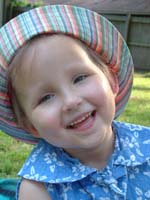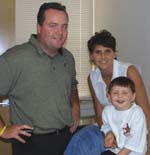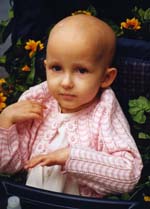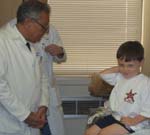Children's Miracle Network broadcast to air June 4, 5
by Heather WoolwinePublic Relations
On June 4 and 5, the Children’s Miracle Network (CMN) will air its annual broadcast from the MUSC Harper Student Center to raise funds for patients at the MUSC Children’s Hospital. This is the Children’s Hospital’s 22nd CMN broadcast.
The event will air on WCSC TV-Channel 5 from 11 a.m. to 4 p.m. both days and include on-air celebrities Bill Sharpe and Debi Chard.
Visitors are welcome.
 Meghan Stample
Meghan Stample Steve and Pam
Crocker with son Carson.
Steve and Pam
Crocker with son Carson.During the broadcast, viewers will meet some of MUSC’s miracle patients who beat the odds against illnesses such as cancer, cystic fibrosis, sickle cell, heart and lung diseases, birth defects, and severe trauma from accidents. Two of MUSC’s miracle patients are Meghan Stample, 6, and Carson Crocker, 4.
All funds generated by the broadcast will go the MUSC Children’s Hospital. During the past 20 years, the broadcast raised more than $7 million, with last year’s broadcast totaling more than $1 million.
CMN is an international, non-profit organization dedicated to raising funds and awareness for 170 children’s hospitals in the U.S. and Canada.
The number to call to make a pledge during the broadcast is 792-8000.
For additional information call the Children’s Hospital Fund special event line at (843) 792-1112.
A smile returns Dee Stample is a mom’s mom… she actively participates in her children’s lives, she carpools, she bakes, she has a career, and she’s a realist. So it made complete sense that when her youngest daughter Meghan’s eyes began to turn inward a little bit, she searched the family history file in her mind and remembered her own mother’s bout with eye muscle issues. Like any one of us, she took her child to see the eye doctor, and he suggested some exercises to strengthen the muscles.
“But then we noticed that she was holding her arms out to the side all the time when she would walk,” Dee said. “Something wasn’t right with her balance because she was using her hands to hold herself up while she walked.”
Every now and then Meghan would become nauseous on the way to school and might even vomit a little, and Dee felt a little guilt for making her little one rush out so soon after breakfast.
It was when Meghan regressed to crawling that Dee decided something still wasn’t right. Naturally, she thought inner ear problems might be affecting her daughter’s balance. Dee made an appointment for Meghan to see her pediatrician and undergo a full physical. That appointment was set for a Friday in February 2002.
As Dee prepared to fly home the day before the appointment from a business trip, she received a call from Meghan’s daycare. When Meghan woke up from her nap, she couldn’t sit up and was incoherent. Dee hurried home and took Meghan to the pediatrician.
“We spent 10 minutes talking to him before he said, ‘You’re going to MUSC,’” Dee said. Dee, frightened of what was happening to her child, arrived at MUSC Children’s Hospital and met with Amy Hutchinson, M.D., then of the Storm Eye Institute. Hutchinson ordered an MRI which detected a medulloblastoma, the most common type of brain tumor, was found in Meghan’s brain stem.
The Stample family rose to action, listening to physicians and nurses, trying to stomach what was happening to their baby. A lost trip to Disney World planned for the following day was almost as heartbreaking to Meghan’s two sisters, Bridgette, 8 in 2002, and Alayna, 6 in 2002, as their sick sibling. Their innocence protected them from fully understanding what was happening to their sister, and the promise of a fight for her life.
Meghan’s tumor was removed and she began six weeks of radiation therapy and 52 weeks of chemotherapy treatments. “MUSC was like our vacation home for two years,” Stample said with a small smile. “It was hard for her to understand what was going on. Meghan, being the typical 3-year-old, was telling everyone that it was her brain tumor and they couldn’t take it from her because it belonged to her. We’ve been in and out ever since.”
Meghan did not tolerate the chemo treatments well though, and she developed a rare condition associated with tumor removal known as posterior fasis syndrome, or a cerebella mutism, during both sets of treatment. Meghan’s parents watched as their daughter’s familiar smile dimples disappeared and she became mute, couldn’t swallow or sit up.
“For weeks she was almost autistic in terms of what her symptoms were like,” Dee said. “She would roll around, thrash; she wasn’t with us at all. The physicians tell you that it’s a temporary problem, but temporary in a mom’s eyes means a couple of days, not weeks or months. But finally, she started to come back and gained some head control.”
Relieved and thinking they’d reached a threshold, Dee worried as she watched her daughter’s tolerance for the chemo became worse and prayed for a good outcome while physicians cut her chemo doses in half. “We almost lost her,” she said. “Some children tolerate it OK and others don’t. Nothing that Meghan went through with her tumor removal and treatment fit in the typical category.” Meghan also developed spasticity, a condition resulting from a subdermal hemotoma that caused a slow bleed in her brain. Meghan spent every day of the next several weeks with her entire body locked and tight as a board, her little toes curled in as she suffered spastic episodes every minute and half. Similar to having a stroke every minute or so, Meghan was helpless as her body tried to heal itself. The only peace she was granted came in the form of a sleeping pill; then and only then, could she find comfort by curling into the fetal position.
“Meghan had a rough time; her course was not typical of patients with this condition. Everyone has complications, but she had more than the average child,” said Julio Barredo, M.D., Pediatrics. “Meghan had a great support system. Her mother was very involved, as a lot of parents are. I used to tease that she was a pain in the neck because she asked so many good questions. She is very smart, and without any formal medical training was able to think from a logical approach when helping us determine what the next course of action should be.”
 Meghan during her
treatment.
Meghan during her
treatment.When it came time for the last half dose of chemo, Barredo told Meghan’s parents that they would skip it because Meghan’s body was too worn, too fragile. It needed to work on its own now.
Meghan, a survivor in each sense of the word, is now almost 7 and continuing down recovery road, as she will attend a regular public school in Dorchester County for the first time this year. “This has been her year,” Dee said. “Her personality, our Meghan, is coming back. She lost the ability to walk but she’s dangerous in a wheelchair.”
Developmentally, Meghan has some catching up to do, and while most parents would be aggravated with their child hiding the silverware, Dee relishes it. “It’s Darwin at its best, watching her evolve,” she said. “She’s rediscovered all the doors and cabinets and drawers and she’s asking questions and going through things. We never know where our silverware is, but that’s just fine.”
With a “crazy sense of humor,” Meghan must now handle sisterly abuse, because as they can see the change in her for the better, they’re not cutting her any more slack. And her dimples are back, in full-force. Dee spoke highly of the Children's Hospital. “As a parent, if you don’t have trust in the people caring for your child, then you have nothing,” she said. “We trusted everyone who took care of Meghan. The physicians and nursing staff within the hospital are very good. Not only does your physician have to be talented, but the nurses must be as well and they develop such an emotional investment in your child. Meghan had every area of the hospital, the PICU, 7A&B, the recovery room and the pediatric ER calling to check on her. Everyone made sure that we had our bases covered, in particular a nurse practitioner named Diane. She bent over backward to make us at ease. If you think about what nurses deal with every day, the workload, residents, doctors, patients and their families—then they provide treatment that sometimes hurts and must deal with fear and rage that parents experience when their child is ill. I’m not sure I would’ve gotten through all of this with my sanity if it hadn’t been for them.”
Nothing to stop this baseball player
Every pregnant woman fears for the health of her child while in utero, and it’s no different when they reach the outside. So it’s understandable when Pam Crocker was upset to find out that her soon-to-be born son, Carson, now 4, had bilateral hydronephrosis, meaning that his kidneys were blocked and functioning incorrectly. While not uncommon for a child to have one blocked kidney, Carson was rare because he had two.
But the rest of Pam’s pregnancy went well and she carried Carson to term. After her delivery at MUSC, Carson was diagnosed with kidney failure and stayed in the NICU to await his two surgeries, one for each kidney, and the hope that the corrective surgeries would restore proper functioning. In addition to Carson’s surgery, he was also treated for bladder reflux, a problem frequently encountered in newborn babies, but one that usually corrects itself. Carson was not in this category, as his reflux was more severe than usual.
Today, Carson’s kidney function rests on the borderline, and he underwent bilateral ureteral reimplantations to heal the inside of his bladder. He leads a fairly normal life, although unable to enjoy certain staples of typical childhood like soda or lots of ice cream.
“His creatinine level was three times the level of an adult when he was born,” said his dad, Steve. “But the staff in the NICU and our doctors took incredible care of him. He’s since handled everything better than most adults probably would. I feel sorry for him knowing that he will have to deal with this his whole life and that dealing with total kidney failure is a real possibility. Our biggest source of stress is what might happen during puberty when the kidneys have to deal with an extra load, as well as the hormonal changes that go with it. But you can’t hold Carson back… the doctor said contact sports were out of the question, but he plays a lot of baseball and golf.”
The avid baseball fan, Carson was excited about attending a RiverDogs game the day he went to have the tubes removed from his belly as a result of the implantation procedure. His plan is to play for the Atlanta Braves one day and Pam said that if baseball is on, her 4-year-old will plop down in front of the TV and stay glued for the duration of the game. The soon to be kindergartner at a new Park West elementary school, Carson lifted his shirt to ask mom some questions about his belly.
“Will he pull the tubes right out of my belly,” he asked quietly. “If he takes them out then we can go to the baseball game tonight,” Pam replied as she and Carson ran fingers over the tubes and incision sites. “Yeah, we’ll have to get those tubes out to go to the game,” Steve said. “It’s got a big sign on the fence that says, ‘No tubes allowed.’”
“Well, me and my doctor can do it,” Carson said with a smile.
 Dr. Ian Aaronson
and Carson discuss getting his tubes removed.
Dr. Ian Aaronson
and Carson discuss getting his tubes removed.Talkative and polite, Carson sat next to Pam and practiced buttoning her shirt while they waited for Ian Aaronson, M.D., Pediatric Urology. “Meeting Dr. Aaronson while I was pregnant made things so much easier for me,” she said. “He’s been our miracle worker and he and the staff have been great. I also think that the Scrub Club was a wonderful idea. When we took Carson in for his surgery this time, he just hopped on the wagon when it was time to go in and was like, ‘Bye! See you later!’”
Despite the occasional tube in his belly or difficulties associated with his condition, Carson is about as normal a 4-year-old as you would ever meet—funny, intelligent, wide-eyed, happy, and above all, determined to grow and thrive. Especially if that means he can play ball.
Friday, June 3, 2005
Catalyst Online is published weekly,
updated
as needed and improved from time to time by the MUSC Office of Public
Relations
for the faculty, employees and students of the Medical University of
South
Carolina. Catalyst Online editor, Kim Draughn, can be reached at
792-4107
or by email, catalyst@musc.edu. Editorial copy can be submitted to
Catalyst
Online and to The Catalyst in print by fax, 792-6723, or by email to
petersnd@musc.edu
or catalyst@musc.edu. To place an ad in The Catalyst hardcopy, call
Community
Press at 849-1778.